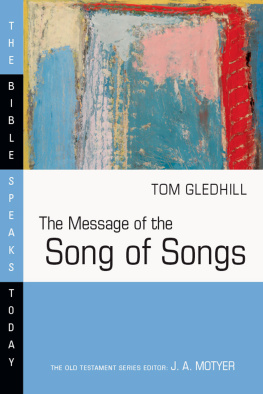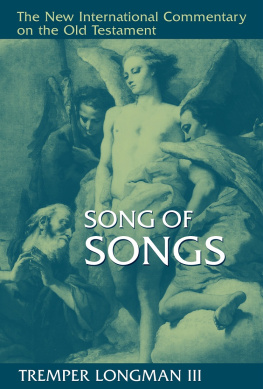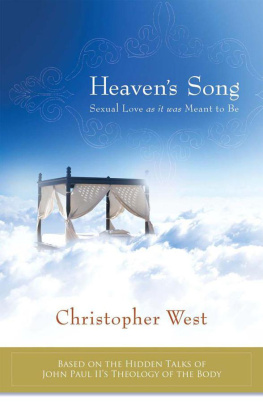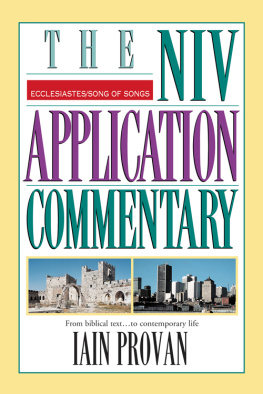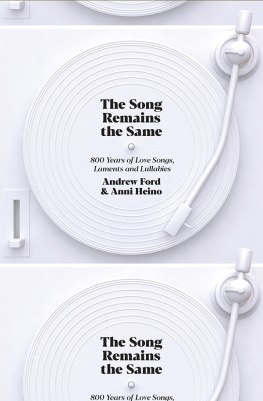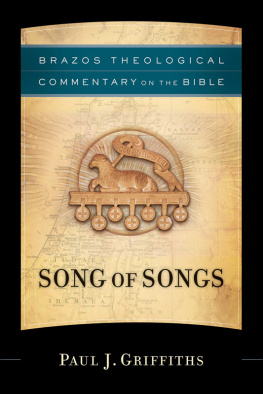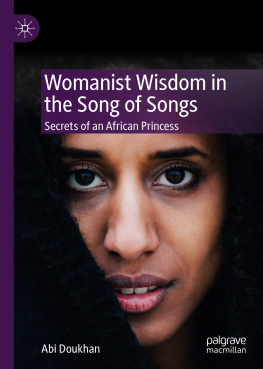THE BIBLE SPEAKS TODAY
The Message of
The Song of Songs
The Lyrics of Love
TOM GLEDHILL
InterVarsity Press, USA
P.O. Box 1400, Downers Grove, IL 605151426, USA
World Wide Web: www.ivpress.com
Email:
Tom Gledhill, 1994
All rights reserved. No part of this publication may be reproduced, stored in a retrieval system or transmitted in any form or by any means, electronic, mechanical, photocopying, recording or otherwise, without the prior permission of InterVarsity Press.
InterVarsity Press, USA, is the book-publishing division of InterVarsity Christian Fellowship/USA, a movement of students and faculty active on campus at hundreds of universities, colleges and schools of nursing in the United States of America, and a member movement of the International Fellowship of Evangelical Students. For information about local and regional activities, write Public Relations Dept., InterVarsity Christian Fellowship/USA, 6400 Schroeder Rd., P.O. Box 7895, Madison, WI 53707-7895, or visit the IVCF website at .
All Scripture quotations, unless otherwise indicated, are taken from the Holy Bible, New International Version. NIV. Copyright 1973, 1978, 1984 by International Bible Society. Used by permission of Zondervan Publishing House. Distributed in the U.K. by permission of Hodder and Stoughton Ltd. All rights reserved. NIV is a registered trademark of International Bible Society. UK trademark number 1448790.
Cover design: Cindy Kiple
Image: Marilee Whitehouse-Holm/Getty Images
ISBN 978-0-8308-8316-5 (digital)
ISBN 978-0-8308-1235-6 (print)
This digital document has been produced by Nord Compo.
The Bible Speaks Today
Series editors: J. A. Motyer (OT)
John R. W. Stott (NT)
The Message of the Song of Songs
The lyrics of love
General preface
The Bible Speaks Today describes a series of both Old Testament and New Testament expositions, which are characterized by a threefold ideal: to expound the biblical text with accuracy, to relate it to contemporary life, and to be readable.
These books are, therefore, not commentaries, for the commentary seeks rather to elucidate the text than to apply it, and tends to be a work rather of reference than of literature. Nor, on the other hand, do they contain the kind of sermons which attempt to be contemporary and readable without taking Scripture seriously enough.
The contributors to this series are all united in their convictions that God still speaks through what he has spoken, and that nothing is more necessary for the life, health and growth of Christians than that they should hear what the Spirit is saying to them through his ancientyet ever modernWord.
J. A. Motyer
J. R. W. Stott
Series Editors
For Serena, with love
Authors preface
The capacity to delight in physical beauty, to be attracted by members of the opposite sex, the desire to form secure and intimate relationships, and to express love and affection in demonstrably physical waysthese are all a very fundamental part of our common humanity. The Song of Songs is an unabashed celebration of these deeply rooted urges. In beautiful poetic language, the Song explores the whole range of emotions experienced by the two lovers, as they work out their commitment to each other. From the aching yearnings for intimacy, to the ecstasy of consummation, from the tensions of separation and the fears of loss, to the relaxed contentment of togetherness, from coquetry and flirtation, to the triumphalism of passion; all these are traced out in the ebb and flow of a growing relationship of mutual love. So we have a strong biblical affirmation of love, loyalty, beauty and sexuality in all their variety. The language of the Song is often very florid. Its intimacies are couched in language sometimes very tender, other times seemingly coarse, crude and extravagant. Nevertheless, throughout its verses, in spite of its many metaphors which may at first sight appear quaint and comical, we have a delightful exposition of courtship and romantic love.
The Song is a unique literary genre in the Old Testament; it is the only example of an extended love-poem in the Bible. It is both beautiful and enigmatic, and has been described as a lock for which the key has been lost. How then are we to find the key to its interpretation? Down the centuries, the Song has spawned an enormous variety of comment and exposition; many of these are bizarre, some fanciful, others simply downright unconvincing. This has arisen mainly because of the embarrassment of commentators in facing the explicit sexuality of the Song. In this exposition I have chosen to plough my own furrow, with only an occasional sidelong glance at other possibilities; to interact constantly with the opinions of others would be intolerably wearisome. The tack I have pursued is to view the Song primarily as a literary poetic exploration of human love. This naturalistic approach may prove too abrupt and limiting for those readers who hold to a different schema. But I would ask them to exercise grace and perseverance in the hope that something may be learned through this approach. Taking the obvious physical line of interpretation means that we have to discuss the intimacies of loving sexual behaviour. This is as delicate as walking on eggshells. However, I have bent over backwards in the attempt to avoid giving offence in the language used and I hope that I will be able to carry the reader comfortably along with me.
The Song, though unique, does not represent the totality of biblical reflection on human love-relationships and sexuality. Our interpretation needs to be informed by the wider biblical context. I have not hesitated to bring into the exposition reflections on other biblical material concerning the issues raised by the Song; namely our creatureliness, our finitude, our mortality, our downright sinfulness, our ultimate destiny, our social and cultural conditioning. But beauty, intimacy and consummation can never be ends in themselves. They can never ultimately satisfy. This is not to denigrate them, but rather to recognize them for what they are. They are pointers to another world, another dimension, only occasionally and very dimly perceived, always seemingly just out of reach around the corner. These transcendental longings, intimations of immortality, are part and parcel of our complex physical, psychological and spiritual natures. Where the text of the Song prompts these ideas, I have felt it worthwhile to comment in this vein. It is almost inevitable that a consideration of human love and sexuality provokes contemplation at levels other than the plainly physical. I hope, however, that the kites I have attempted to fly are anchored to the text by threads which are sufficiently strong to enable me to avoid being cast into the same sort of mould as the exponents of the extreme allegorical method.
We live in an age when modern methods of mass communication have allowed an unprecedented expansion of the possibilities for the exploitation of human sexuality. Not that our own generation is necessarily more promiscuous than any other age. Basic human nature never changes, though cultural and social mores do. But today we live in an era where we are bombarded from every side with commercialized eroticism. From advertisement hoardings, films, TV, videos and novels, promiscuous sexual gratification is publicly placarded as an acceptable part of our society. Love has degenerated into lust, liberty into licentiousness. The desire for instant and immediate satisfaction of every urge is paramount. Permanency in relationships is outwith the result that we have domestic disintegration, unmarried fathers, unmarried mothers and, most recently, the tragedy of Aids. The modern Christian is immersed in this society, and is under obligation to offer the hope of a better way, the way of Christian marriage, the way of unabashed delight in a sexuality within the framework of a secure and stable relationship. It is a gross distortion of the Christian worldview to denigrate human sexuality as something sinful. The agnostic poet Swinburne, in a particularly monstrous caricature, wrote the following lines:

